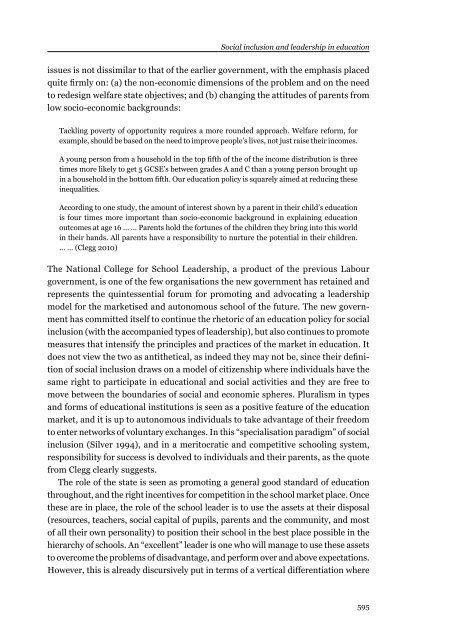Social inclusion and leadership in education: An evolution of roles ...
Social inclusion and leadership in education: An evolution of roles ...
Social inclusion and leadership in education: An evolution of roles ...
- No tags were found...
You also want an ePaper? Increase the reach of your titles
YUMPU automatically turns print PDFs into web optimized ePapers that Google loves.
<strong>Social</strong> <strong><strong>in</strong>clusion</strong> <strong>and</strong> <strong>leadership</strong> <strong>in</strong> <strong>education</strong>issues is not dissimilar to that <strong>of</strong> the earlier government, with the emphasis placedquite firmly on: (a) the non-economic dimensions <strong>of</strong> the problem <strong>and</strong> on the needto redesign welfare state objectives; <strong>and</strong> (b) chang<strong>in</strong>g the attitudes <strong>of</strong> parents fromlow socio-economic backgrounds:Tackl<strong>in</strong>g poverty <strong>of</strong> opportunity requires a more rounded approach. Welfare reform, forexample, should be based on the need to improve people’s lives, not just raise their <strong>in</strong>comes.A young person from a household <strong>in</strong> the top fifth <strong>of</strong> the <strong>of</strong> the <strong>in</strong>come distribution is threetimes more likely to get 5 GCSE’s between grades A <strong>and</strong> C than a young person brought up<strong>in</strong> a household <strong>in</strong> the bottom fifth. Our <strong>education</strong> policy is squarely aimed at reduc<strong>in</strong>g these<strong>in</strong>equalities.Accord<strong>in</strong>g to one study, the amount <strong>of</strong> <strong>in</strong>terest shown by a parent <strong>in</strong> their child’s <strong>education</strong>is four times more important than socio-economic background <strong>in</strong> expla<strong>in</strong><strong>in</strong>g <strong>education</strong>outcomes at age 16 … … Parents hold the fortunes <strong>of</strong> the children they br<strong>in</strong>g <strong>in</strong>to this world<strong>in</strong> their h<strong>and</strong>s. All parents have a responsibility to nurture the potential <strong>in</strong> their children.… … (Clegg 2010)The National College for School Leadership, a product <strong>of</strong> the previous Labourgovernment, is one <strong>of</strong> the few organisations the new government has reta<strong>in</strong>ed <strong>and</strong>represents the qu<strong>in</strong>tessential forum for promot<strong>in</strong>g <strong>and</strong> advocat<strong>in</strong>g a <strong>leadership</strong>model for the marketised <strong>and</strong> autonomous school <strong>of</strong> the future. The new governmenthas committed itself to cont<strong>in</strong>ue the rhetoric <strong>of</strong> an <strong>education</strong> policy for social<strong><strong>in</strong>clusion</strong> (with the accompanied types <strong>of</strong> <strong>leadership</strong>), but also cont<strong>in</strong>ues to promotemeasures that <strong>in</strong>tensify the pr<strong>in</strong>ciples <strong>and</strong> practices <strong>of</strong> the market <strong>in</strong> <strong>education</strong>. Itdoes not view the two as antithetical, as <strong>in</strong>deed they may not be, s<strong>in</strong>ce their def<strong>in</strong>ition<strong>of</strong> social <strong><strong>in</strong>clusion</strong> draws on a model <strong>of</strong> citizenship where <strong>in</strong>dividuals have thesame right to participate <strong>in</strong> <strong>education</strong>al <strong>and</strong> social activities <strong>and</strong> they are free tomove between the boundaries <strong>of</strong> social <strong>and</strong> economic spheres. Pluralism <strong>in</strong> types<strong>and</strong> forms <strong>of</strong> <strong>education</strong>al <strong>in</strong>stitutions is seen as a positive feature <strong>of</strong> the <strong>education</strong>market, <strong>and</strong> it is up to autonomous <strong>in</strong>dividuals to take advantage <strong>of</strong> their freedomto enter networks <strong>of</strong> voluntary exchanges. In this “specialisation paradigm” <strong>of</strong> social<strong><strong>in</strong>clusion</strong> (Silver 1994), <strong>and</strong> <strong>in</strong> a meritocratic <strong>and</strong> competitive school<strong>in</strong>g system,responsibility for success is devolved to <strong>in</strong>dividuals <strong>and</strong> their parents, as the quotefrom Clegg clearly suggests.The role <strong>of</strong> the state is seen as promot<strong>in</strong>g a general good st<strong>and</strong>ard <strong>of</strong> <strong>education</strong>throughout, <strong>and</strong> the right <strong>in</strong>centives for competition <strong>in</strong> the school market place. Oncethese are <strong>in</strong> place, the role <strong>of</strong> the school leader is to use the assets at their disposal(resources, teachers, social capital <strong>of</strong> pupils, parents <strong>and</strong> the community, <strong>and</strong> most<strong>of</strong> all their own personality) to position their school <strong>in</strong> the best place possible <strong>in</strong> thehierarchy <strong>of</strong> schools. <strong>An</strong> “excellent” leader is one who will manage to use these assetsto overcome the problems <strong>of</strong> disadvantage, <strong>and</strong> perform over <strong>and</strong> above expectations.However, this is already discursively put <strong>in</strong> terms <strong>of</strong> a vertical differentiation where595

















